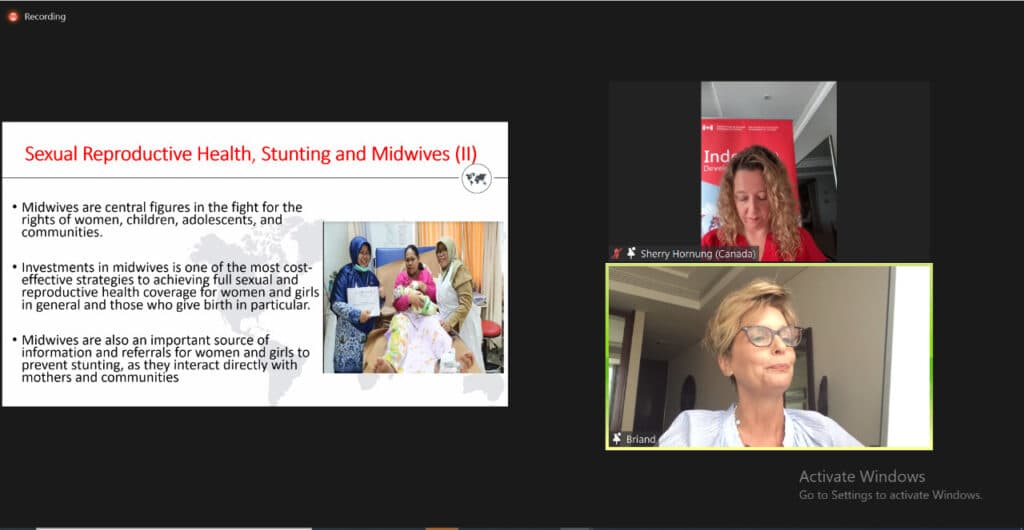
The support to reducing stunting prevalence is needed from both national and international levels. As a strategic step, the National Population and Family Planning Board (BKKBN) and the Embassy of Canada to Indonesia organized a virtual Ambassador Talk Event themed “Reproductive Health for Adolescents to Combat Stunting” on June 26th, 2021.
According to Indonesia’s Basic Health Survey Data (Riskesdas), the rate of stunting in the country has decreased from 37.2% in 2013 to 30.18% in 2018. Nevertheless, stunting prevalence remains high compared to the World Health Organization’s (WHO) standard of 20%.
The Chairman of BKKBN, Dr.(HC) Hasto Wardoyo, MD, OBGYN, asserted that, “The President of the Republic of Indonesia Joko Widodo mandated BKKBN to lead stunting reduction program. The goal of this mandate is to bring down stunting rate from 27.6% to 14% by 2024. This means that Indonesia must reduce stunting rate by 2.7% each year. Hence, strategic and extraordinary steps are needed right now.”
“While stunting reduction is a national priority for Indonesia, there challenge is still huge. For this reason, BKKBN requires support from all parties both national and international to accelerate stunting reduction and reach the goals that have been set in Indonesia by the President. Collaboration using multi-sector and multi-stakeholder approach is important,” added Hasto.

Hasto further said that, “Various direct and indirect interventions to address causes of stunting are needed. Some of the direct interventions include 1) supplementary feeding for pregnant women and poor community; 2) blood supplement tablet; 3) breastfeeding counseling and promotion; 4) management of malnutrition; 5) monitoring of growth and promotions.
Meanwhile, interventions targeting indirect causes of stunting include; 1) improvement of drinking water supply and sanitation; 2) improvement of access and quality of nutrition services and health; 3) Raising awareness, commitment, the practice of mother and child care and nutrition; 4) increasing access to nutritious food.
Haston also explained, “Ensuring appropriate nutrition is the key to optimize the health of girls, pregnant women, mothers, and newborn babies. Therefore, intervention planning must follow human’s life cycle, including pre-pregnancy stage. Malnutrition in pregnant women also has adverse impacts on the mother and child, such as maternal mortality, premature birth, miscarriage, malnutrition, and other health risks, including stunting. Earlier interventions that target young girls are important.”

Deputy of Training, Research, and Development of BKKBN, Prof. Rizal M Damanik, Ph.D. in his presentation said that, “Adolescence is a period of physical, mental, and intellectual development. During period, adolescents experience rapid and significant development in their bodies. Adolescents are also know to be curious, passionate, adventurous, and are less hesitant to take risks, at times without careful consideration. Wrong decisions may lead them to fall into high-risk behaviors”
“These risky behaviors include pre-marital sex, which is quite prominen right now. This could result in unwanted pregnancy, unsafe abortion, change of partners, sexual infectious disease, other risky sexual behaviors, even the transmission of the human immunodeficiency virus (HIV).”
“In addition, early marriage and childbearing at a young age are important issues to be discussed with Indonesian youth. Early marriage results in some health problems for mothers and infants. According to research, early marriage of under 20 years increases stunting risk in children”.
The purpose of this event is to strengthen the collaboration between BKKBN and Canada to tackle adolescent reproductive health problems in Indonesia through promoting cooperation between Canada with BKKBN or GenRe Foundation; alleviate stunting in Indonesia; and develop opportunities for creation and innovation regarding Bangga Kencana Program in terms of education, training, technology, and knowledge building.
The Ambassador of Canada to Indonesia Cameron MacKay said that, “Since 2018, Canada has been supporting the Better Reproductive Health and Rights for All in Indonesia (BERANI) project which discusses health reproductive problems. In the stunting reduction context, the involvement of men is important especially during pregnancy and childrearing. Many research, including Indonesian research, show that the more the father is involved, the likelihood for mothers to provide exclusive breastfeeding is higher, which is key for the nutrition of infants. Therefore, a fair portion of domestic duties among men and women is good not only for women but also for the whole family.”

Sherry Hornung, Head of Cooperation of the Canadian Embassy in Indonesia added, BERANI focuses on the improvement of midwives’ skills through education and training; sexual, reproductive health and rights; comprehensive strengthening on sexual education, and advocacy and community-based program to prevent gender-based violence, child marriage, and female genital mutilation.